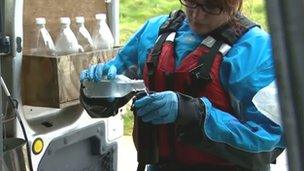Beaches' blue flags at risk due to wet summer pollution
- Published
Almost a third of Wales' blue flag beaches could be stripped of their status due to the poor summer weather.
Environment Agency Wales (EAW) said the wettest UK summer in 100 years has resulted in a rise in bacteria levels in the water due to sewage pollution.
Businesses have expressed fear of a drop in trade if the blue flag status of their local beach is lost.
From next year, new rules will see water quality for blue flags assessed over four years rather than one.
The blue flag award is issued by the Foundation for Environmental Education (FEE), which rates beaches on categories including facilities, environmental management, water quality and all-round cleanliness.
Forty three beaches and five marinas in Wales earned the status in 2012, two more than in 2011.
But EAW said samples taken from beaches since May had shown a temporary increase in bacteria which could have come from a variety of sources:
Rainwater running off farm land washing sheep and cattle waste into streams and rivers, and subsequently the sea
Storm sewage systems releasing diluted sewage into rivers (by design) to protect homes from flooding
Animal waste (from dogs and birds for example) from urban areas being washed into rivers
Poor household plumbing where sewage flows untreated into drainage systems and rivers
Leaks from badly maintained cesspits and septic tanks
The agency added that a lack of sunshine had also failed to improve the situation as the sun's UV rays would usually kill some of the bacteria found in the sea.
Although the bacteria was not at a high enough level to pose a risk to people, the agency said it would affect bathing water classifications for 2013, due to be announced later in the year.
Chris Mills, director of EAW, said: "The heavy rain this summer has not only caused significant flooding and problems for farmers and tourism, it has also affected bathing waters at some of our beaches.
'Tougher standards'
"It is disappointing as the trend for bathing waters in recent years is on the up, but the record rainfall this year could buck this trend."
EAW would not name the beaches it thought might lose their blue flags, but Keep Britain Tidy said research in England suggested that 20-30% of beaches there could be at risk, and a similar proportion in Wales.
Sandra Hall, assistant manager of the Beach Motel in Treaddur Bay, near Holyhead, Anglesey, said the bay's blue flag status was vital to the local economy.
"It's very important to the small businesses around here," she said.
"They advertise it as a blue flag beach and when people read the website they see the blue flag banner and they appreciate that it's a clean beach.
"If they lost the blue flag I think this business would definitely suffer the consequences."
"If the business is going down, there's not going to be any work - people will actually lose their jobs."

In future, beaches will be judged on an average of samples over four years
EAW said bathing water in Wales had improved significantly over the last 20 years, partly due to a £1bn Welsh Water investment programme over that time.
The agency added it would continue to work with Welsh Water to ensure it met the higher standards which are being officially introduced in 2015 but will be followed from next year.
Fergus O'Brien, coastal waters manager for Welsh Water, said the new European regulations were "twice as tight" as the current water quality standard.
"I do believe people will fear the loss of a blue flag means the water isn't safe to go in, to go swimming, but that's not the case - it's as good as it ever was," he said.
He added that the new rules could put some blue flags at risk, but they would not be judged on one bad summer.
"Under the new regulations it does get slightly better in the sense that we don't just use one year's samples - we use a four-year rolling average of the samples," he said.
"If it's excellent over four years, a bad year like this is less likely to have a detrimental effect on the beach - it takes a number of years for a beach to fail the award."
The official bathing water quality figures are due to be announced by the Welsh government in November.
- Published17 May 2012
- Published7 March 2012
- Published8 November 2011
- Published26 May 2011